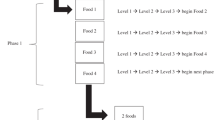Abstract
Although some children with feeding disorders may have the necessary skills to feed themselves, they may lack motivation to self-feed solids and liquids. Rivas, Piazza, Roane, Volkert, Stewart, Kadey, and Groff (Journal of Applied Behavior Analysis, 47, 1–14, 2014) and Vaz, Volkert, and Piazza (Journal of Applied Behavior Analysis, 44, 915–920, 2011) successfully increased self-feeding for children who lacked motivation to self-feed by manipulating either the quantity or the quantity and quality of bites that the therapist fed the child if he or she did not self-feed. In the current investigation, we present three case examples to illustrate some challenges we faced when using these procedures outlined in the aforementioned studies and how we addressed these challenges.


Similar content being viewed by others
References
Carruth, B. R., & Skinner, J. D. (2002). Feeding behaviors and other motor development in healthy children (2–24 months). Journal of the American College of Nutrition, 21, 88–96. doi:10.1080/07315724.2002.10719199.
Collins, B., Gast, D., Wolery, M., Holcombe, A., & Leatherby, J. (1991). Using constant time delay to teach self-feeding to young students with severe/profound handicaps: evidence of limited effectiveness. Journal of Developmental and Physical Disabilities, 3, 157–179. doi:10.1007/bf01045931.
Fisher, W., Piazza, C. C., Bowman, L. G., Hagopian, L. P., Owens, J. C., & Slevin, I. (1992). A comparison of two approaches for identifying reinforcers for persons with severe and profound disabilities. Journal of Applied Behavior Analysis, 25, 491–498.
Gulotta, C. S., Piazza, C. C., Patel, M. R., & Layer, S. A. (2005). Using food redistribution to reduce packing in children with severe food refusal. Journal of Applied Behavior Analysis, 38, 39–50.
Hoch, T. A., Babbitt, R. L., Coe, D. A., Krell, D. M., & Hackbert, L. (1994). Contingency contacting: combining positive reinforcement and escape extinction procedures to treat persistent food refusal. Behavior Modification, 18, 106–128.
Kerwin, M. E. (1999). Empirically supported treatments in pediatric psychology: severe feeding problems. Journal of Pediatric Psychology, 24, 193–214.
Levin, D., Volkert, V. M., & Piazza, C. C. (2014). A multicomponent treatment package to reduce packing in children with feeding and autism spectrum disorders. Behavior Modification, 38, 940–963. doi:10.1177/0145445514550683.
Luiselli, J. K. (1988a). Behavioral feeding intervention with deaf-blind, multihandicapped children. Child and Family Behavior Therapy, 10, 49–72. doi:10.1300/j019v10n04_06.
Luiselli, J. K. (1988b). Improvement of feeding skills in multihandicapped students through paced-prompting interventions. Journal of Developmental and Physical Disabilities, 1, 17–30. doi:10.1007/bf01110553.
Luiselli, J. K. (1993). Training self-feeding skills in children who are deaf and blind. Behavior Modification, 4, 457–473. doi:10.1177/01454455930174003.
Mueller, M. M., Piazza, C. C., Patel, M. R., Kelley, M. E., & Pruett, A. (2004). Increasing variety of foods consumed by blending nonpreferred foods into preferred foods. Journal of Applied Behavior Analysis., 37, 159–170. doi:10.1901/jaba.2004.37-159.
O’Brien, F., Bugle, C., & Azrin, N. H. (1972). Training and maintaining a retarded child’s proper eating. Journal of Applied Behavior Analysis, 5, 67–72. doi:10.1901/jaba.1972.5-67.
Peterson, K. M., Volkert, V. M., & Zeleny, J. (2015). Increasing self-drinking for children with feeding disorders. Journal of Applied Behavior Analysis, 48, 436–441. doi:10.1002/jaba.210.
Piazza, C. C., Anderson, C., & Fisher, W. W. (1993). Teaching self-feeding skills to children with Rett syndrome. Developmental Medicine and Child Psychology, 35, 991–996. doi:10.1111/j.1469-8749.1993.tb11581.x.
Pridham, K. F. (1990). Feeding behavior of 6- to 12-month-old infants: assessment and sources of parental information. Journal of Pediatrics, 117, 174–180. doi:10.1016/s0022-3476(05)80016-2.
Rivas, K.M., Piazza, C.C., Roane, H.S., Volkert, V.M., Stewart, V., Kadey, H.J., & … Groff, R.A. (2014). Analysis of self-feeding in children with feeding disorders. Journal of Applied Behavior Analysis, 47, 1–14. doi: 10.1002/jaba.170
Sharp, W. G., Odom, A., & Jaquess, D. L. (2012). Comparison of upright and flipped spoon presentations to guide treatment of food refusal. Journal of Applied Behavior Analysis, 45, 83–96. doi:10.1901/jaba.2012.45-83.
Sisson, L., & Dixon, M. (1986a). A behavioral approach to the training and assessment of feeding skills in multihandicapped children. Applied Research in Mental Retardation, 7, 149–163. doi:10.1016/0270-3092(86)90002-0.
Sisson, L. A., & Dixon, M. J. (1986b). Improving mealtime behaviors through token reinforcement. Behavior Modification, 10, 333–354. doi:10.1177/01454455860103005.
Stimbert, V., Minor, J., & McCoy, J. (1977). Intensive feeding training with retarded children. Behavior Modification, 1, 517–529. doi:10.1177/014544557714005.
Vaz, P. C. M., Volkert, V. M., & Piazza, C. C. (2011). Using negative reinforcement to increase self-feeding in a child with food selectivity. Journal of Applied Behavior Analysis, 44, 915–920. doi:10.1901/jaba.2011.44-915.
Volkert, V. M., & Piazza, C. C. (2012). Empirically supported treatments for pediatric feeding disorders. In P. Sturmey & M. Herson (Eds.), Handbook of evidence based practice in clinical psychology. Hoboken: Wiley. doi:10.1002/9781118156391.ebcp001013.
Volkert, V. M., Vaz, P. M., Piazza, C. C., Frese, J., & Barnett, L. (2011). Using a flipped spoon to decrease packing in children with feeding disorders. Journal of Applied Behavior Analysis, 44, 617–621. doi:10.1901/jaba.2011.44-617.
Author information
Authors and Affiliations
Corresponding author
Ethics declarations
All procedures performed in this study were in accordance with the ethical standards of the institutional committee and with the 1964 Helsinki declaration and its later amendments or comparable ethical standards.
Funding
This study was not funded by a grant.
Informed consent
Informed consent was obtained from the parent(s) of all children included in the study.
Conflict of interest
Valerie Volkert, Cathleen Piazza, and Rachel Ray-Price declare that they have no conflict of interest.
Additional information
An erratum to this article is available at http://dx.doi.org/10.1007/s40617-016-0126-z.
Rights and permissions
About this article
Cite this article
Volkert, V.M., Piazza, C.C. & Ray-Price, R. Further Manipulations in Response Effort or Magnitude of an Aversive Consequence to Increase Self-Feeding in Children with Feeding Disorders. Behav Analysis Practice 9, 103–113 (2016). https://doi.org/10.1007/s40617-016-0124-1
Published:
Issue Date:
DOI: https://doi.org/10.1007/s40617-016-0124-1




